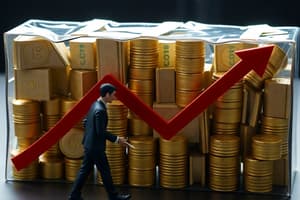Podcast
Questions and Answers
Which of the following defines inflation most accurately?
Which of the following defines inflation most accurately?
- Unchanged prices of goods and services
- A decrease in the general price level
- A sustained increase in the general price level (correct)
- Fluctuations in the price of goods and services
What factor is likely to cause demand-pull inflation?
What factor is likely to cause demand-pull inflation?
- Increase in demand for goods and services (correct)
- Stable demand for goods and services
- Fluctuations in demand for goods and services
- Decrease in demand for goods and services
In the context of inflation, what happens when input costs increase?
In the context of inflation, what happens when input costs increase?
- Input costs remain stable
- Input costs have no effect on prices
- Input costs decrease
- Input costs increase (correct)
How can inflation expectations impact actual inflation?
How can inflation expectations impact actual inflation?
What effect does inflation have on the purchasing power of money?
What effect does inflation have on the purchasing power of money?
How does inflation typically affect the standard of living?
How does inflation typically affect the standard of living?
What is the impact of inflation on the standard of living?
What is the impact of inflation on the standard of living?
How can individuals mitigate the negative impacts of inflation on savings?
How can individuals mitigate the negative impacts of inflation on savings?
What are monetary and fiscal policies primarily aimed at controlling?
What are monetary and fiscal policies primarily aimed at controlling?
Why is understanding inflation important for policymakers?
Why is understanding inflation important for policymakers?
What can individuals do to contribute to managing inflation?
What can individuals do to contribute to managing inflation?
In what way can individuals best protect their savings during inflation?
In what way can individuals best protect their savings during inflation?
Flashcards are hidden until you start studying
Study Notes
- Inflation is a sustained increase in the general price level of goods and services.
- Demand-pull inflation is caused by an increase in demand for goods and services.
- Cost-push inflation occurs when input costs increase.
- Inflation expectations can contribute to actual inflation by leading to higher wages and production costs.
- Inflation decreases the purchasing power of money.
- Inflation reduces the standard of living.
- Individuals can mitigate the negative impacts of inflation on savings by investing in assets that typically appreciate with inflation.
- Monetary and fiscal policies aim at controlling inflation.
- Understanding inflation is important for policymakers to implement effective policies to stabilize the economy.
- Individuals can contribute to managing inflation by making informed decisions about spending and investments.
Studying That Suits You
Use AI to generate personalized quizzes and flashcards to suit your learning preferences.




